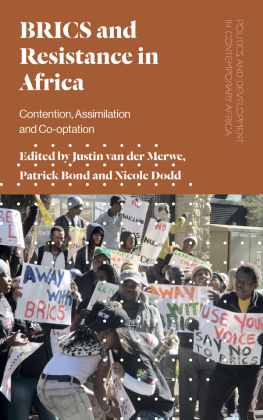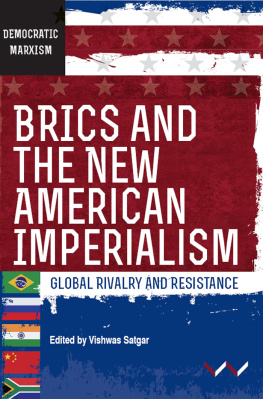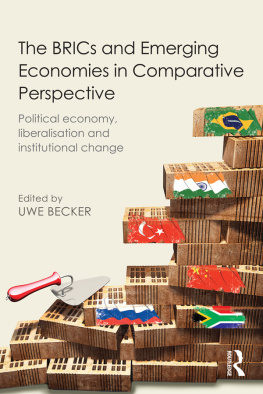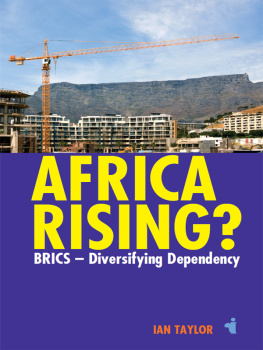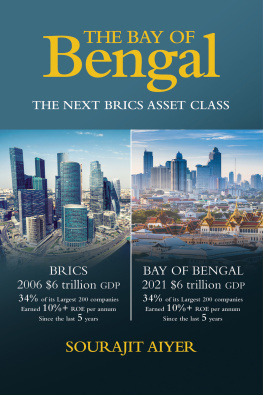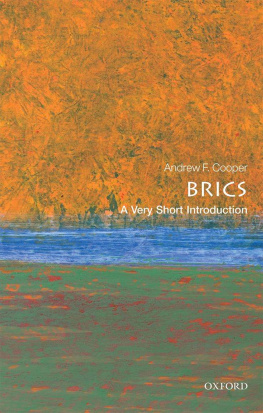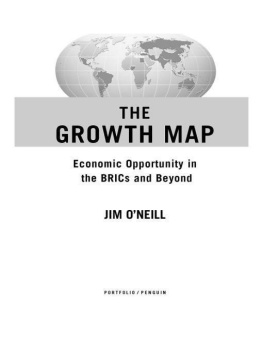
When the BRICS was created, nave enthusiasts claimed that this bloc were the heralds of a new dawn of South-South cooperation and would favourably transform the global political economy. As this volume makes clear, class power exercised by elites in the Global South, particularly from the larger economies, merely reproduces tendencies already extant and in doing so, provokes resistance from those most affected by exploitation and inequality.
Ian Taylor, University of St Andrews
Resistance to BRICS exploitation is as important as fighting Western multinational corporate abuse. Scholar-activists everywhere need to know why we grassroots organisers are targeting the BRICS and its bank here in South Africa, and why our allies across Africa are upset with the most predatory BRICS-based firms. After you read this important book, your solidarity with us will be welcome.
Makoma Lekalakala, Earthlife Africa director, and 2018 Goldman Environmental Prize winner
Politics and Development in Contemporary Africa
Published by one of the worlds leading publishers on African issues, Politics and Development in Contemporary Africa seeks to provide accessible but in-depth analysis of key contemporary issues affecting countries within the continent. Featuring a wealth of empirical material and case study detail, and focusing on a diverse range of subject matter from conflict to gender, development to the environment the series is a platform for scholars to present original and often provocative arguments. Selected titles in the series are published in association with the International African Institute.
Editorial board
Rita Abrahamsen (University of Ottawa); Morten Boas (Norwegian Institute of International Affairs); David Booth (Overseas Development Institute); Padraig Carmody (Trinity College Dublin); Neil Carrier (University of Bristol); Fantu Cheru (Leiden University); Kevin Dunn (Hobart and William Smith Colleges); Amanda Hammar (University of Copenhagen); Alcinda Honwana (Open University); Paul Jackson (University of Birmingham); Gabrielle Lynch (University of Warwick); Zachariah Mampilly (Vassar College); Henning Melber (Dag Hammarskjld Foundation); Garth A. Myers (Trinity College Hartford Connecticut); Lonce Ndikumana (UMass Amherst); Cyril Obi (Social Science Research Council); Susan Parnell (University of Cape Town); Mareike Schomerus (Overseas Development Institute); Laura Seay (Morehouse College); Howard Stein (University of Michigan); Mats Utas (Uppsala University); Alex de Waal (Tufts University)
Already published
Mobility between Africa, Asia and Latin America: Economic Networks and Cultural Interactions , edited by Ute Rschenthaler and Alessandro Jedlowski
Agricultural Development in Rwanda: Authoritarianism, Markets and Spaces of Governance , Chris Huggins
Liberias Female Veterans: War, Roles and Reintegration , Leena Vastapuu and Emmi Nieminen
Food Aid in Sudan: A History of Power, Politics and Profit , Susanne Jaspars
Kakuma Refugee Camp: Humanitarian Urbanism in Kenyas Accidental City , Bram J. Jansen
Development Planning in South Africa: Provincial Policy and State Power in the Eastern Cape , John Reynolds
Aids in the Shadow of Biomedicine: Inside South Africas Epidemic , Isak Niehaus
Forthcoming titles
Slum Africa: Life and Governance at the Margins in Accra , Paul Stacey
Infrastructure and Hybrid Governance in the Democratic Republic of Congo , edited by Kristof Titeca and Tom De Herdt
Struggle and Sociality in Tanzanias Informal Economy: The Micro-politics of Social Relations in Dar es Salaam , Alexis Malefakis
BRICS and
Resistance in
Africa
Contention, Assimilation and Co-optation
Edited by Justin van der Merwe, Patrick
Bond, and Nicole Dodd

In association with the
International African Institute
BRICS and Resistance in Africa was first published in 2019 by Zed Books Ltd, The Foundry, Oval Way, London SE RR, UK.
www.zedbooks.net
Editorial Copyright Justin van der Merwe, Patrick Bond, and Nicole Dodd, Copyright in this Collection Zed Books
The editors hereby assert to the publisher their moral right to be identified as the editors of the work in accordance with sections and of the Copyright, Designs and Patents Act 1988 .
Typeset in Plantin by Swales and Willis Ltd, Exeter, Devon
Cover design by Burgess and Beech
Cover photo Patrick Bond
Printed and bound by CPI Group (UK), Ltd, Croydon, CR YY, UK
All rights reserved. No part of this publication may be reproduced, stored in a retrieval system or transmitted in any form or by any means, electronic, mechanical, photocopying or otherwise, without the prior permission of Zed Books Ltd.
A catalogue record for this book is available from the British Library
ISBN -- 78699 -- hb
ISBN -- 78699 -- pdf
ISBN -- 78699 -- epub
ISBN -- 78699 -- mobi

Acknowledgements and dedication
Any book is the sum of many peoples efforts. But the editors would like to give a special thanks to the Dean of the Faculty of Military Science, Professor Samuel Tshehla, and Stellenbosch University for their financial support of this project. We wish to also acknowledge Lwando Mthamo and Jeanne Enslins dedicated editorial support. Also, we are indebted to Ken Barlow from Zed Books for his support and comments during the proposal phase of our project, and to Kim Walker for taking up the reins. Lastly, we wish to express our gratitude to the anonymous reviewers of our manuscript.
For Daniella.
About the contributors
, Lecturer, Department of Political and Administrative Studies, University of Zambia
, Professor, Wits School of Governance, University of Witwatersrand, South Africa
, Chair, School of Human and Organisational Development, University of Stellenbosch, South Africa
, Lecturer, International Relations and Development, Mulungushi University, Zambia, and Doctoral Candidate, University of KwaZulu-Natal
, Senior Lecturer, Department of Geography and Environmental Studies, University of Zambia, Zambia and Research Affiliate, School of Tourism and Hospitality, University of Johannesburg, South Africa
, Lecturer, Department of Sociology, University of South Africa, and Doctoral Candidate, Wits School of Governance
, Director, Centre for Natural Resource Governance, Zimbabwe, and Doctoral Candidate, Wits School of Governance
, Researcher, Centre for Military Studies, University of Stellenbosch, South Africa
, Researcher, Centre for Military Studies, University of Stellenbosch, South Africa
, Postdoctoral Fellow, Institute for Dispute Resolution in Africa, University of South Africa, South Africa
, Chair, Department of Mercantile and Public Law (Mil), University of Stellenbosch, South Africa
, Researcher, Centre for Southern Africa Studies, Institute for African Studies of the Russian Academy of Sciences, Russia.
, Associate Professor, Department of Political Science and International Studies, University of Pecs, Hungary
, Professor, School of Government, University of the Western Cape, South Africa
, Senior Researcher, Centre for Military Studies, University of Stellenbosch, South Africa
Published in association with the International African Institute
The principal aim of the International African Institute is to promote scholarly understanding of Africa, notably its changing societies, cultures, and languages. Founded in 1926 and based in London, it supports a range of seminars and publications including the journal Africa .
Next page
